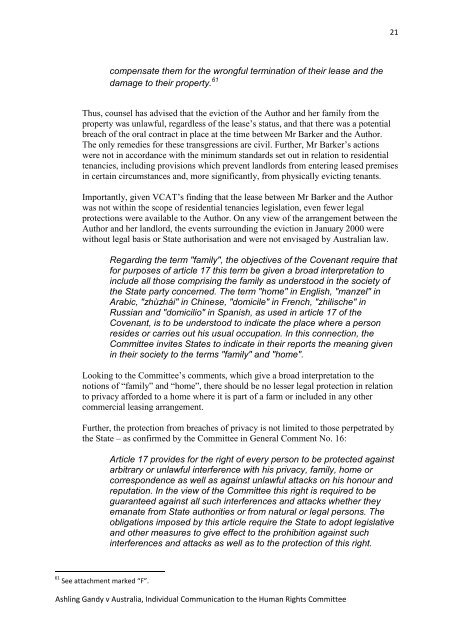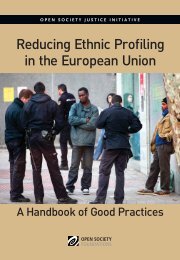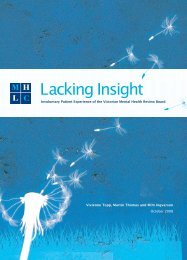individual communication to the united nations ... - Community Law
individual communication to the united nations ... - Community Law
individual communication to the united nations ... - Community Law
Create successful ePaper yourself
Turn your PDF publications into a flip-book with our unique Google optimized e-Paper software.
21compensate <strong>the</strong>m for <strong>the</strong> wrongful termination of <strong>the</strong>ir lease and <strong>the</strong>damage <strong>to</strong> <strong>the</strong>ir property. 61Thus, counsel has advised that <strong>the</strong> eviction of <strong>the</strong> Author and her family from <strong>the</strong>property was unlawful, regardless of <strong>the</strong> lease‟s status, and that <strong>the</strong>re was a potentialbreach of <strong>the</strong> oral contract in place at <strong>the</strong> time between Mr Barker and <strong>the</strong> Author.The only remedies for <strong>the</strong>se transgressions are civil. Fur<strong>the</strong>r, Mr Barker‟s actionswere not in accordance with <strong>the</strong> minimum standards set out in relation <strong>to</strong> residentialtenancies, including provisions which prevent landlords from entering leased premisesin certain circumstances and, more significantly, from physically evicting tenants.Importantly, given VCAT‟s finding that <strong>the</strong> lease between Mr Barker and <strong>the</strong> Authorwas not within <strong>the</strong> scope of residential tenancies legislation, even fewer legalprotections were available <strong>to</strong> <strong>the</strong> Author. On any view of <strong>the</strong> arrangement between <strong>the</strong>Author and her landlord, <strong>the</strong> events surrounding <strong>the</strong> eviction in January 2000 werewithout legal basis or State authorisation and were not envisaged by Australian law.Regarding <strong>the</strong> term "family", <strong>the</strong> objectives of <strong>the</strong> Covenant require thatfor purposes of article 17 this term be given a broad interpretation <strong>to</strong>include all those comprising <strong>the</strong> family as unders<strong>to</strong>od in <strong>the</strong> society of<strong>the</strong> State party concerned. The term "home" in English, "manzel" inArabic, "zhùzhái" in Chinese, "domicile" in French, "zhilische" inRussian and "domicilio" in Spanish, as used in article 17 of <strong>the</strong>Covenant, is <strong>to</strong> be unders<strong>to</strong>od <strong>to</strong> indicate <strong>the</strong> place where a personresides or carries out his usual occupation. In this connection, <strong>the</strong>Committee invites States <strong>to</strong> indicate in <strong>the</strong>ir reports <strong>the</strong> meaning givenin <strong>the</strong>ir society <strong>to</strong> <strong>the</strong> terms "family" and "home".Looking <strong>to</strong> <strong>the</strong> Committee‟s comments, which give a broad interpretation <strong>to</strong> <strong>the</strong>notions of “family” and “home”, <strong>the</strong>re should be no lesser legal protection in relation<strong>to</strong> privacy afforded <strong>to</strong> a home where it is part of a farm or included in any o<strong>the</strong>rcommercial leasing arrangement.Fur<strong>the</strong>r, <strong>the</strong> protection from breaches of privacy is not limited <strong>to</strong> those perpetrated by<strong>the</strong> State – as confirmed by <strong>the</strong> Committee in General Comment No. 16:Article 17 provides for <strong>the</strong> right of every person <strong>to</strong> be protected againstarbitrary or unlawful interference with his privacy, family, home orcorrespondence as well as against unlawful attacks on his honour andreputation. In <strong>the</strong> view of <strong>the</strong> Committee this right is required <strong>to</strong> beguaranteed against all such interferences and attacks whe<strong>the</strong>r <strong>the</strong>yemanate from State authorities or from natural or legal persons. Theobligations imposed by this article require <strong>the</strong> State <strong>to</strong> adopt legislativeand o<strong>the</strong>r measures <strong>to</strong> give effect <strong>to</strong> <strong>the</strong> prohibition against suchinterferences and attacks as well as <strong>to</strong> <strong>the</strong> protection of this right.61 See attachment marked “F”.Ashling Gandy v Australia, Individual Communication <strong>to</strong> <strong>the</strong> Human Rights Committee
















